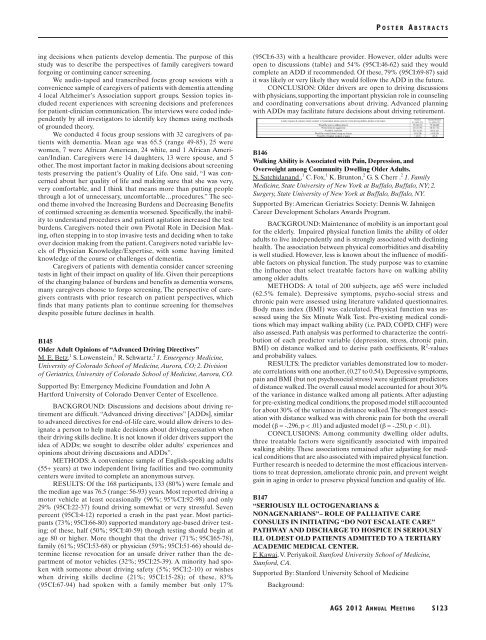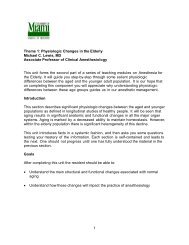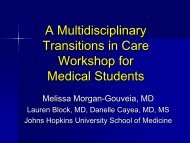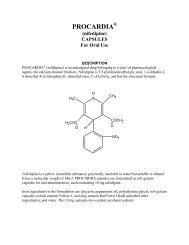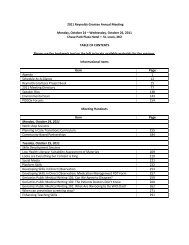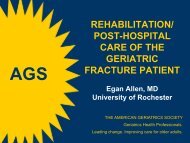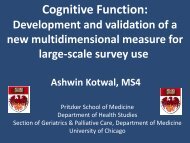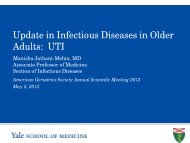Here - American Geriatrics Society
Here - American Geriatrics Society
Here - American Geriatrics Society
Create successful ePaper yourself
Turn your PDF publications into a flip-book with our unique Google optimized e-Paper software.
P OSTER<br />
A BSTRACTS<br />
ing decisions when patients develop dementia. The purpose of this<br />
study was to describe the perspectives of family caregivers toward<br />
forgoing or continuing cancer screening.<br />
We audio-taped and transcribed focus group sessions with a<br />
convenience sample of caregivers of patients with dementia attending<br />
4 local Alzheimer’s Association support groups. Session topics included<br />
recent experiences with screening decisions and preferences<br />
for patient-clinician communication. The interviews were coded independently<br />
by all investigators to identify key themes using methods<br />
of grounded theory.<br />
We conducted 4 focus group sessions with 32 caregivers of patients<br />
with dementia. Mean age was 65.5 (range 49-85), 25 were<br />
women, 7 were African <strong>American</strong>, 24 white, and 1 African <strong>American</strong>/Indian.<br />
Caregivers were 14 daughters, 13 were spouse, and 5<br />
other. The most important factor in making decisions about screening<br />
tests preserving the patient’s Quality of Life. One said, “I was concerned<br />
about her quality of life and making sure that she was very,<br />
very comfortable, and I think that means more than putting people<br />
through a lot of unnecessary, uncomfortable…procedures.” The second<br />
theme involved the Increasing Burdens and Decreasing Benefits<br />
of continued screening as dementia worsened. Specifically, the inability<br />
to understand procedures and patient agitation increased the test<br />
burdens. Caregivers noted their own Pivotal Role in Decision Making,<br />
often stepping in to stop invasive tests and deciding when to take<br />
over decision making from the patient. Caregivers noted variable levels<br />
of Physician Knowledge/Expertise, with some having limited<br />
knowledge of the course or challenges of dementia.<br />
Caregivers of patients with dementia consider cancer screening<br />
tests in light of their impact on quality of life. Given their perceptions<br />
of the changing balance of burdens and benefits as dementia worsens,<br />
many caregivers choose to forgo screening. The perspective of caregivers<br />
contrasts with prior research on patient perspectives, which<br />
finds that many patients plan to continue screening for themselves<br />
despite possible future declines in health.<br />
B145<br />
Older Adult Opinions of “Advanced Driving Directives”<br />
M. E. Betz, 1 S. Lowenstein, 1 R. Schwartz. 2 1. Emergency Medicine,<br />
University of Colorado School of Medicine, Aurora, CO; 2. Division<br />
of <strong>Geriatrics</strong>, University of Colorado School of Medicine, Aurora, CO.<br />
Supported By: Emergency Medicine Foundation and John A<br />
Hartford University of Colorado Denver Center of Excellence.<br />
BACKGROUND: Discussions and decisions about driving retirement<br />
are difficult. “Advanced driving directives” [ADDs], similar<br />
to advanced directives for end-of-life care, would allow drivers to designate<br />
a person to help make decisions about driving cessation when<br />
their driving skills decline. It is not known if older drivers support the<br />
idea of ADDs; we sought to describe older adults’ experiences and<br />
opinions about driving discussions and ADDs”.<br />
METHODS: A convenience sample of English-speaking adults<br />
(55+ years) at two independent living facilities and two community<br />
centers were invited to complete an anonymous survey.<br />
RESULTS: Of the 168 participants, 133 (80%) were female and<br />
the median age was 76.5 (range: 56-93) years. Most reported driving a<br />
motor vehicle at least occasionally (96%; 95%CI:92-98) and only<br />
29% (95CI:22-37) found driving somewhat or very stressful. Seven<br />
percent (95CI:4-12) reported a crash in the past year. Most participants<br />
(73%; 95CI:66-80) supported mandatory age-based driver testing;<br />
of these, half (50%; 95CI:40-59) though testing should begin at<br />
age 80 or higher. More thought that the driver (71%; 95CI65-78),<br />
family (61%; 95CI:53-68) or physician (59%; 95CI:51-66) should determine<br />
license revocation for an unsafe driver rather than the department<br />
of motor vehicles (32%; 95CI:25-39). A minority had spoken<br />
with someone about driving safety (5%; 95CI:2-10) or wishes<br />
when driving skills decline (21%; 95CI:15-28); of these, 83%<br />
(95CI:67-94) had spoken with a family member but only 17%<br />
(95CI:6-33) with a healthcare provider. However, older adults were<br />
open to discussions (table) and 54% (95CI:46-62) said they would<br />
complete an ADD if recommended. Of these, 79% (95CI:69-87) said<br />
it was likely or very likely they would follow the ADD in the future.<br />
CONCLUSION: Older drivers are open to driving discussions<br />
with physicians, supporting the important physician role in counseling<br />
and coordinating conversations about driving. Advanced planning<br />
with ADDs may facilitate future decisions about driving retirement.<br />
B146<br />
Walking Ability is Associated with Pain, Depression, and<br />
Overweight among Community Dwelling Older Adults.<br />
N. Satchidanand , 1 C. Fox, 1 K. Brunton, 2 G. S. Cherr . 2 1. Family<br />
Medicine, State University of New York at Buffalo, Buffalo, NY; 2.<br />
Surgery, State University of New York at Buffalo, Buffalo, NY.<br />
Supported By: <strong>American</strong> <strong>Geriatrics</strong> <strong>Society</strong>: Dennis W. Jahnigen<br />
Career Development Scholars Awards Program.<br />
BACKGROUND: Maintenance of mobility is an important goal<br />
for the elderly. Impaired physical function limits the ability of older<br />
adults to live independently and is strongly associated with declining<br />
health. The association between physical comorbidities and disability<br />
is well studied. However, less is known about the influence of modifiable<br />
factors on physical function. The study purpose was to examine<br />
the influence that select treatable factors have on walking ability<br />
among older adults.<br />
METHODS: A total of 200 subjects, age ≥65 were included<br />
(62.5% female). Depressive symptoms, psycho-social stress and<br />
chronic pain were assessed using literature validated questionnaires.<br />
Body mass index (BMI) was calculated. Physical function was assessed<br />
using the Six Minute Walk Test. Pre-existing medical conditions<br />
which may impact walking ability (i.e. PAD, COPD, CHF) were<br />
also assessed. Path analysis was performed to characterize the contribution<br />
of each predictor variable (depression, stress, chronic pain,<br />
BMI) on distance walked and to derive path coefficients, R 2 -values<br />
and probability values.<br />
RESULTS: The predictor variables demonstrated low to moderate<br />
correlations with one another, (0.27 to 0.54). Depressive symptoms,<br />
pain and BMI (but not psychosocial stress) were significant predictors<br />
of distance walked.The overall causal model accounted for about 30%<br />
of the variance in distance walked among all patients. After adjusting<br />
for pre-existing medical conditions, the proposed model still accounted<br />
for about 30% of the variance in distance walked.The strongest association<br />
with distance walked was with chronic pain for both the overall<br />
model (β = -.296, p < .01) and adjusted model (β = -.250, p < .01).<br />
CONCLUSIONS: Among community dwelling older adults,<br />
three treatable factors were significantly associated with impaired<br />
walking ability. These associations remained after adjusting for medical<br />
conditions that are also associated with impaired physical function.<br />
Further research is needed to determine the most efficacious interventions<br />
to treat depression, ameliorate chronic pain, and prevent weight<br />
gain in aging in order to preserve physical function and quality of life.<br />
B147<br />
“SERIOUSLY ILL OCTOGENARIANS &<br />
NONAGENARIANS”– ROLE OF PALLIATIVE CARE<br />
CONSULTS IN INITIATING “DO NOT ESCALATE CARE”<br />
PATHWAY AND DISCHARGE TO HOSPICE IN SERIOUSLY<br />
ILL OLDEST OLD PATIENTS ADMITTED TO A TERTIARY<br />
ACADEMIC MEDICAL CENTER.<br />
F. Kawai, V. Periyakoil. Stanford University School of Medicine,<br />
Stanford, CA.<br />
Supported By: Stanford University School of Medicine<br />
Background:<br />
AGS 2012 ANNUAL MEETING<br />
S123


